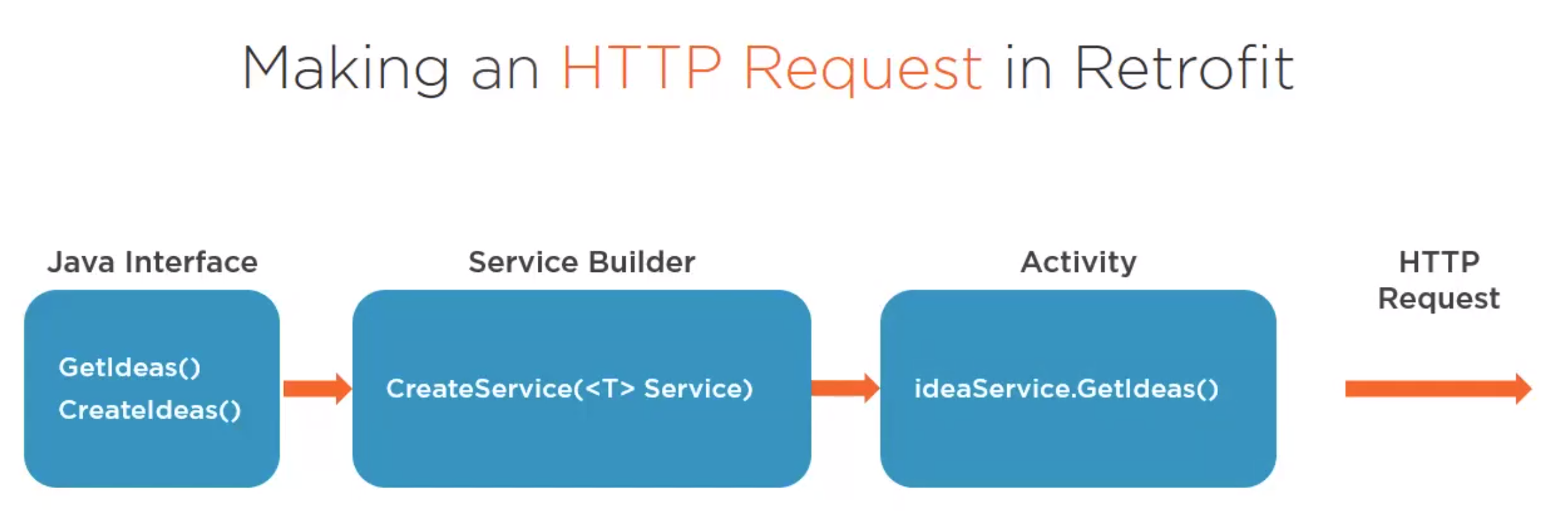Retrofit
Resource
During the course there were demo server APIs
https://github.com/alex-wolf-ps/RetrofitAPINode
https://github.com/alex-wolf-ps/RetrofitAPIDotnet
https://github.com/alex-wolf-ps/AndroidGlobomanticsApp
Getting Started
Permissions
We need to allow apps to use the internet so we need to add permissions to the manifest.
<uses-permission android:name="android.permission.INTERNET" />
Add Retrofit and Gson to Gradle
In the app gradle add
implementation group: 'com.squareup.retrofit2', name: 'retrofit', version: '2.8.0'
implementation group: 'com.squareup.retrofit2', name: 'converter-gson', version: '2.9.0'
Making a Request
Introduction
To do this we need to do three steps

Step 1 Define the interface
interface ContractService {
@GET("contacts")
Call<List<Idea>> getContacts()
@POST("contract")
Call<Idea> createContract(@Body Contact contact)
@PUT("contracts")
Call<Idea> updateContract(@Body Contact contact)
@DELETE("contracts")
Call<Idea> updateContract(@Path("id") int contactId)
}
Step 2 Configuring and Building the Service
We need to create a Build and Retrofit class
- Build Class, defines the configurations
- Retrofit Class, creates instances of the service
Step 3 Send And Receive
We can then use the service. For this we need to implement a
- Success Handler
- Error Handler
ideaService.getIdeas()
Old Projects
Use Java 8
Sometimes when using older projects with gradle you might see
Couldn't determine java version from '11.0.1'
This is because of an old version of gradle. The easiest way to solve it is to go to the command line and change your JAVA_HOME is 8 e.g.
export JAVA_HOME=/usr/lib/jvm/java-8-openjdk-amd64
Gradle 3.3 to 4.10
To achieve this I change the build.gradle to update the plugin and specify the maven and google repositories.
buildscript {
repositories {
google()
jcenter()
maven { url "https://plugins.gradle.org/m2/" }
}
dependencies {
classpath 'com.android.tools.build:gradle:3.0.1'
// NOTE: Do not place your application dependencies here; they belong
// in the individual module build.gradle files
}
}
allprojects {
repositories {
google()
jcenter()
}
}
And ran gradlew not gradle and also updated the gradle.warapper.properties
distributionUrl=https\://services.gradle.org/distributions/gradle-4.4-all.zip
From there I could use the standard update to 4.10
./gradlew wrapper --gradle-version 4.10
Gradle 4.10 to 5.4.1
For this I needed to change the plugin in build.gradle to be
classpath 'com.android.tools.build:gradle:3.5.1'
And of course the gradle.warapper.properties
distributionUrl=https\://services.gradle.org/distributions/gradle-5.4.1-all.zip
I also need to change the SDK build toools in the app to be 26
android {
compileSdkVersion 26
buildToolsVersion "26.0.2"
defaultConfig {
applicationId "com.example.alexr.ideamanager"
minSdkVersion 21
targetSdkVersion 26
versionCode 1
versionName "1.0"
testInstrumentationRunner "android.support.test.runner.AndroidJUnitRunner"
}
Next I need to change the following from the 25 version
compile 'com.android.support:appcompat-v7:25.3.1'
compile 'com.android.support:support-v4:25.3.1'
compile 'com.android.support:recyclerview-v7:25.3.1'
compile 'com.android.support:design:25.3.1'
To
compile 'com.android.support:appcompat-v7:26.0.1'
compile 'com.android.support:support-v4:26.0.1'
compile 'com.android.support:recyclerview-v7:26.0.1'
compile 'com.android.support:design:26.0.1'
Gradle 5.4.1 to 6.x
To do this I started Android Studio where I was prompted to upgrade to 6.x